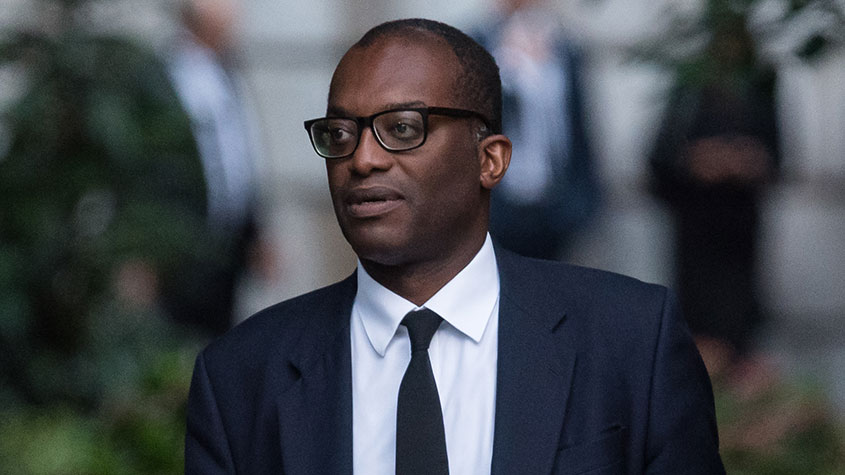The latest news on the energy price cap
The government is to bring in an “Energy Price Guarantee” to help householders with their energy costs, plus a huge package of support for businesses. Rupert Hargreaves looks at what's planned.


Get the latest financial news, insights and expert analysis from our award-winning MoneyWeek team, to help you understand what really matters when it comes to your finances.
You are now subscribed
Your newsletter sign-up was successful
Want to add more newsletters?

Twice daily
MoneyWeek
Get the latest financial news, insights and expert analysis from our award-winning MoneyWeek team, to help you understand what really matters when it comes to your finances.

Four times a week
Look After My Bills
Sign up to our free money-saving newsletter, filled with the latest news and expert advice to help you find the best tips and deals for managing your bills. Start saving today!
Last week Liz Truss announced that energy prices will be capped at £2,500 a year for a typical home for up to two years, under the government’s new Energy Price Guarantee (EPG).
The EPG will apply to the unit cost of energy, in the same way Ofgem applies (ed) its own price cap. Ofgem had set the cap at £3,549 from October for an average household, with some projections showing bills will top £6,000 next year.
The energy price cap is the maximum price per kilowatt hour (kWH) of energy, plus standing charges, that providers can charge for gas and electricity.
MoneyWeek
Subscribe to MoneyWeek today and get your first six magazine issues absolutely FREE

Sign up to Money Morning
Don't miss the latest investment and personal finances news, market analysis, plus money-saving tips with our free twice-daily newsletter
Don't miss the latest investment and personal finances news, market analysis, plus money-saving tips with our free twice-daily newsletter
On top of this cap, the previously announced £400 energy bill discount will still apply, and green levies costing £150 will be temporarily removed. That means the average household bill will remain stable at roughly the current level of £1,971.
While the government’s announcement is a huge development for the UK energy market, it’s worth noting that the £2,500 figure is still an average. Some homes will pay more for their energy and some will pay less.
According to the government’s numbers, this plan will save households £1,000 a year.
Unit rates under the new guarantee
The EPG will fix unit rates for domestic customers. Prices suppliers pay to buy and sell the energy will still continue to change, but the government, rather than consumers, will pay the difference.
Unlike the previously announced support packages, which left some users out in the cold (quite literally), this policy is designed to help all domestic users.
The EPG will apply to unit rates rather than standing charges. Standing charges will stay as set by Ofgem for October 2022.
The announced rates are as follows:
- Electricity: 34p per kWh with a standing charge of 46p per day
- Gas: 10.3p per kWh with a standing charge of 28p per day
Once again, these are averages. Standing charges will vary from region to region. Some parts of the UK (primarily remote regions) have seen big jumps in standing charges over the past couple of years as the cost of supplying energy has risen. Other more densely populated regions, such as London, have escaped these hikes.
As such, the only way to be sure how much you will be charged is to check and review any statements from your energy provider.
If you’re on a fixed tariff the government has said that your unit prices will be reduced by 17p/kWh for electricity and 4.2p/kWh for gas.
Excluding the impact of the government’s additional £400 energy bill discount, these figures suggest energy prices on standard variable rate tariffs will still jump by 27% in October.
There’s also no getting away from the fact that the typical household on a standard variable rate tariff will still be paying a lot more for energy this winter than they were last. Last year the price was set at 20.8p/kWh for electricity and 4.1p/kWh for gas.
Under the EPG users will be paying 1.6 times more for electricity this year than last winter, and 2.5 times more for gas.
A new energy price cap for businesses
The government is also introducing a huge package of support for businesses. Under these new plans, businesses are going to have their energy costs capped at the same price per unit or kilowatt hour (kWh) as households. That will come as a tremendous relief for business owners across the country struggling with rising energy bills.
However, while the initial plan is to cap prices for six months, the scheme will be reviewed after three to see if more targeted support is needed for individual sectors, such as hospitality and manufacturing.
This big bazooka of spending from the government could have a huge price tag. Most analysts expect the cost will come in at about £150bn, although the final figure could be much lower or much higher. It depends on where global energy prices trade over the next two years.
Truss and her team have said they’re not planning to introduce windfall taxes to pay for the spending. Instead, they’re concentrating on boosting supply and working with energy producers to lower costs.
The new PM is going to launch a new oil licensing round, potentially as early as next week with scope to grant as many as 100 new exploration licences. On top of this, a new Energy Supply Taskforce will negotiate with suppliers to agree long-term contracts with the aim of reducing the price they charge for energy.
Further, Truss announced today a £40bn liquidity facility to help energy companies deal with volatile hydrocarbon prices and stem the chances of a cash flow crisis.
Bold plans to keep a lid on prices
These are very bold plans, and we’re going to have to wait and see how much they’ll cost. The new chancellor, Kwasi Kwarteng, will set out the expected costs in a fiscal statement later this month.
But one thing is for sure: Truss has made a big splash here in her first week in office. Capping energy costs could completely change the outlook for the economy over the next two years, and ramping up spending on oil and gas exploration may change the face of energy in the UK for decades to come.
These changes will affect everything from government and business spending plans, to consumer confidence, the rate of inflation and the Bank of England’s view of further interest rate hikes.
Economists already expect the package to knock five percentage points from peak inflation, potentially saving the government as much as £25bn in interest costs this year.
SEE ALSO:
Get the latest financial news, insights and expert analysis from our award-winning MoneyWeek team, to help you understand what really matters when it comes to your finances.

Rupert is the former deputy digital editor of MoneyWeek. He's an active investor and has always been fascinated by the world of business and investing. His style has been heavily influenced by US investors Warren Buffett and Philip Carret. He is always looking for high-quality growth opportunities trading at a reasonable price, preferring cash generative businesses with strong balance sheets over blue-sky growth stocks.
Rupert has written for many UK and international publications including the Motley Fool, Gurufocus and ValueWalk, aimed at a range of readers; from the first timers to experienced high-net-worth individuals. Rupert has also founded and managed several businesses, including the New York-based hedge fund newsletter, Hidden Value Stocks. He has written over 20 ebooks and appeared as an expert commentator on the BBC World Service.
-
 Early signs of the AI apocalypse?
Early signs of the AI apocalypse?Uncertainty is rife as investors question what the impact of AI will be.
-
 Reach for the stars to boost Britain's space industry
Reach for the stars to boost Britain's space industryopinion We can’t afford to neglect Britain's space industry. Unfortunately, the government is taking completely the wrong approach, says Matthew Lynn
-
 Winter Fuel Payment cut to hit ‘1.5 million’ pensioners - what support does your energy supplier offer?
Winter Fuel Payment cut to hit ‘1.5 million’ pensioners - what support does your energy supplier offer?Advice The Winter Fuel Payment is being scrapped for most pensioners this year. But you may be able to access extra support from your energy supplier. Here’s what’s on offer.
-
 Act now to bag NatWest-owned Ulster Bank's 5.2% easy access savings account
Act now to bag NatWest-owned Ulster Bank's 5.2% easy access savings accountUlster Bank is offering savers the chance to earn 5.2% on their cash savings, but you need to act fast as easy access rates are falling. We have all the details
-
 Moneybox raises market-leading cash ISA to 5%
Moneybox raises market-leading cash ISA to 5%Savings and investing app MoneyBox has boosted the rate on its cash ISA again, hiking it from 4.75% to 5% making it one of top rates. We have all the details.
-
 October NS&I Premium Bonds winners - check now to see what you won
October NS&I Premium Bonds winners - check now to see what you wonNS&I Premium Bonds holders can check now to see if they have won a prize this month. We explain how to check your premium bonds
-
 The best packaged bank accounts
The best packaged bank accountsAdvice Packaged bank accounts can offer great value with useful additional perks – but get it wrong and you could be out of pocket
-
 Bank of Baroda closes doors to UK retail banking
Bank of Baroda closes doors to UK retail bankingAfter almost 70 years of operating in the UK, one of India’s largest bank is shutting up shop in the UK retail banking market. We explain everything you need to know if you have savings or a current account with Bank of Baroda
-
 How to earn cashback on spending
How to earn cashback on spendingFrom credit cards and current accounts to cashback websites, there are plenty of ways to earn cashback on the money you spend
-
 John Lewis mulls buy now, pay later scheme
John Lewis mulls buy now, pay later schemeThe CEO of John Lewis has said the retailer will consider introducing buy now, pay later initiatives for lower-priced items.